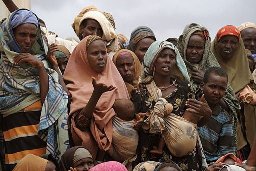 The UN officially declared famine in two southern Somalia regions Wednesday as the world slowly mobilised to save 12 million people battling hunger in the region’s worst drought in 60 years.
The UN officially declared famine in two southern Somalia regions Wednesday as the world slowly mobilised to save 12 million people battling hunger in the region’s worst drought in 60 years.
The United States urged Al Qaeda-inspired Shebab rebels controlling the area to allow the return of relief groups they expelled two years ago, while aid groups warned many would die without urgent action and funding.
UN humanitarian coordinator for Somalia Mark Bowden declared that southern Bakool and Lower Shabelle regions had been hit by famine.
In total, the UN said an estimated 3.7 million people — or nearly half of the war-torn country’s population — were facing a food crisis.
“If we don’t act now, famine will spread to all eight regions of southern Somalia within two months, due to poor harvests and infectious disease outbreaks,” Bowden told reporters in neighbouring Kenya.
“If we are not able to intervene immediately, tens of thousands more Somalis may die,” the UN added.
Somalia, which has been affected by almost uninterrupted conflict for 20 years and become a by-word for “failed state”, is the worst affected nation but parts of Kenya, Uganda, Ethiopia and Djibouti are also hit.
“Given the combination of severity and geographic scope this is the most severe food security crisis in Africa since the 1991/2 Somalia famine,” the UN added.
A UN definition of famine entails that at least 20 percent of households face extreme food shortages, acute malnutrition in over 30 percent of people, and two deaths per 10,000 people every day.
The Shebab expelled foreign aid groups two years ago, accusing them of being Western spies and Christian crusaders.
However, the UN last week airlifted in the first supplies since the group said it would lift restrictions on aid.
Malnutrition rates in Somalia are the highest in the world, with peaks of 50 percent in certain areas in the south, Bowden said.
“Every day of delay in assistance is literally a matter of life or death for children and their families in the famine affected areas,” Bowden said.
UN Secretary General Ban Ki-moon urged donor countries to immediately come up with $1.6 billion in aid to combat a crisis he said would have an increasingly devastating effect on Somalia and its neighbours.
“If funding is not made available for humanitarian intervention now, the famine is likely to continue and spread,” said Ban.
“Children and adults are dying at an appalling rate. Every day of delay may cause more lives lost.”
Over 78,000 Somalis have fled to seek refuge in neighbouring Ethiopia and Kenya in the last two months.
In Kenya, they are streaming into overcrowded camps hosting some 380,000 people — more than four times the original capacity.
On Tuesday, the UN refugee agency said death rates among refugees arriving in Ethiopia’s Dolo Ado area reached 7.4 per 10,000 in June, 15 times more than the baseline rate in sub-Sahara Africa.
Somalia’s embattled government welcomed the famine declaration — the first since the term was defined by the UN in 2008 — as a sign that the world was beginning to acknowledge the scope of the disaster.
“At least it is great that the world has recognised the magnitude of hardship the poor Somalis are facing,” Abdulkadir Moalim Nur, a minister in the president’s office, told AFP.
The Food and Agricultural Organisation appealed Wednesday for $120 million (84 million euros) for the 12 million drought victims in the Horn of Africa.
Aid group Oxfam said only $200 million of the required $1 billion had been provided.
“There is no time to waste if we are to avoid massive loss of life. We must not stand by and watch this tragedy unfold before our eyes,” said Fran Equiza, Oxfam’s Regional Director.
The government’s authority over the vast country is limited and Johnnie Carson, the US assistant secretary of state for African affairs, said the Shebab’s responsibility in the suffering was clear.
A top Shebab official welcomed the UN’s famine declaration, saying the group would allow aid through.
“We would like to see aid coming to the people,” the official told AFP on condition of anonymity.
“Aid must be provided purely on a humanitarian basis, and the religious value of Somalis as Muslims must be respected.”
UN agencies will meet in Rome to discuss the humanitarian crisis on Monday.


